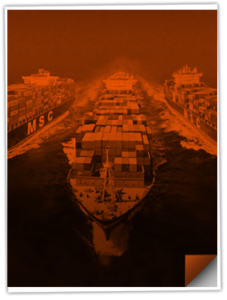Featured Headlines:
Life’s a Glitch, and Then You Can’t Fly!
More ILA Drama on the Daggett Dock-et
China Choo-Chooses Its Way to Rail Freight "Haul" of Fame
BIS Updates Girl and Boycott Requester List
High-Flying Flag Enforcement Begins September 19th
Gemini Alliance May Not Pass Go
The Sport of Exporting Date Debacles
Life’s a Glitch, and Then You Can’t Fly!
- Global cybersecurity powerhouse, Crowd Strike, dropped a wrench in the global gears of commerce and communications while attempting a Microsoft update this morning.
- Microsoft was quoted as saying, “not it, yo” while Crowd Strike said, “so it.” In this delightful era of accountability, what a breath of fresh air these comments provoke!
- Despite our playful tone, this cyber outage was no laughing matter for healthcare professionals and facilities, banks, broadcasters, and the airline industry. It is believed that today’s service failure represents the largest of its kind in human history. Yowza!
- Let’s place the airline industry in the high-altitude spotlight while highlighting their many lowlights from the “glitch”:
- 1,200 flights into and out of the US and 10,000+ globally were delayed.
- The Federal Aviation Administration (FAA) Notice to Air Missions System (NOTAM) was compromised and failed.
- The FAA was forced to delay all US departures due to the NOTAM outage.
- To restore routes and service integrity, many flights were outright cancelled, stranding passengers.
- Airlines will incur financial losses, higher insurance costs, increased compensation claims, brand damage, and greater investor scrutiny.
- From what we gather, this global calamity can be traced to one corrupted file being downloaded at just the wrong time. This implies that a single individual is to blame.
- So, loyal readers, as you battle the airlines, steamship lines, forwarders, and truckers in your life for the best possible deals… tirelessly representing your companies’ interests… hearing the same-old, same-old excuses for rate increases and longer transits… hey, at least you are not poor Joe Smith of Crowd Strike, the wrench-tossing techie who helped the world grind to a halt while grounding the airline business!
More ILA Drama on the Daggett Dock-et
- The International Longshoremen’s Association (ILA) warned that a strike is becoming more likely as contract talks with the United States Maritime Alliance (USMX) hit rough seas.
- The ILA’s President, Harold Daggett, has emphasized that his 45,000 members won’t work past the contract’s expiration on September 30th without a shiny new agreement in place.
- The ILA rejected any federal intervention, dismissing the Biden administration and the Department of Labor as unwelcome backseat drivers.
- Central to the ILA’s grievances are complaints against Maersk’s terminal arm and their techy shenanigans at the Port of Mobile.
- Daggett boasts that his crew is 100% behind him, ready to “hit the streets” and swab the decks with protest signs.
- The USMX’s Board of Directors is meeting next week and will certainly be crossing their fingers and toes that they can move the bargaining ship forward.
- Unlike the last round of talks that sailed smoothly to a tentative agreement by June of 2018, these negotiations are taking the scenic route, leaving us spectators seasick and anxious…among other things!
China Choo-Chooses Its Way to Rail Freight "Haul" of Fame
- Chinese rail freight managed to chug its way well past a new monthly record in June, as containerized volumes rang in at 332 million tons—a 6.1% increase year-over-year (YoY).
- Domestic volumes were up 18% compared to June 2023, while China-Europe volumes rose 11%, with more than 180,000 TEUs sent to Europe.
- The Chinese government is using rail freight to boost post-COVID economic momentum, touting Middle Corridor Eurasia services as an alternative to airfreight during the Red Sea crisis.
- Currently, rates for 20-foot containers to Europe are around $8,000 from Central China and $9,400 from east coast cities. Normally, these kinds of numbers come with caviar and champagne in a sleeper car; ocean services around Africa may be long, but at least they are currently overpriced! Pass the bubbly, rail is looking better than ever, baby!
- Similarly, less-than-container-loads (LCLs) are charged at approximately $295 per cubic meter, with some forwarders advertising slightly lower rates.
BIS Updates Girl and Boycott Requester List
- The Bureau of Industry and Security (BIS) has revised their boycott requester list to account for the addition of 57 entities, after becoming aware that US persons had either identified a foreign party as having made a reportable boycott request and/or the foreign party removed boycott language in transaction documents with US entities.
- The updated public list of entities who have been identified as having made a boycott-related request in reports received by BIS officials now totals 127 entities.
- If a company appears on this list, it doesn’t necessarily mean that it violated the boycott regulations; however, businesses should review it to see if they’ve been on the receiving end of a “naughty or nice” transaction.
- Should a request be made, all parties identified must report it to the Office of Antiboycott (OAC) via their boycott request reporting form. If a request has been made, all parties must report this request to the Office of Antiboycott.
- If a request is not reported, this could mean substantial penalties for all parties involved-the exporter, the forwarder, the financial institution, individuals, and other US persons.
- This list is yet another tool in the “compliance toolbox” for companies to check to identify possible boycott-related language and to determine whether US persons have a reporting requirement to BIS pursuant to Part 760 of the Export Administration Regulations (EAR).
- According to Assistant Secretary for Export Enforcement Matthew S. Axelrod, “In its first three months of existence, the boycott Requester List has enabled numerous U.S. companies to identify potential sources of reportable boycott-related requests, and today’s update will further support these compliance efforts.”
- The full list is posted on the OAC’s webpage. If you believe that you have been listed in error or would like to discuss a listing, please contact OAC officials directly.
High-Flying Flag Enforcement Begins September 19th
- Beginning September 19, 2024, the US Department of Agriculture’s AMS AM8 tariff flag will change from a ‘warning severity’ to a ‘reject severity’ in US Customs and Border Protection’s (CBP) Automated Commercial Environment (ACE).
- However, AM7 flags will continue to be enforced with a warning severity.
- Other amendments to the rulemaking include, but are not limited to, the following:
- If the importer is not listed as ‘certified’ in the Organic Integrity Database, then the National Organic Program (NOP) certificate will be invalid.
- The use of the temporary “999” code will be discontinued.
- Any parties suspected of non-compliance with these changes should expect to receive cease-and-desist letters and other penalties.
- For the full details, please refer to CSMS # 61139474.
- Additional rule information can be found on the USDA’s Strengthening Organic Enforcement webpage.
FMC Reopens Chassis Probe
- The Federal Maritime Commission (FMC) has reignited its investigation into chassis provisioning practices at several US ports, including Los Angeles/Long Beach (LA/LB), Chicago, Memphis, and Savannah as of June 15, 2024 (dun, dun, dun…!).
- This probe is to ensure compliance with a February cease-and-desist order that mandates motor carriers must have the freedom to choose their chassis. Is it just us, or does it feel like a lot of folks have been insistin’ on ceasin’ and desistin’?
- The order followed allegations that chassis providers have overcharged motor carriers by a staggering $1.8 billion over a three-year period.
- It very well could be true what they say about old dogs learning new tricks (or not learning, that is), as the investigation is a response to reports that some providers are just not adhering to the order.
- Ultimately, the FMC probe will assess whether the required policy changes have been implemented and if motor carriers are receiving the intended benefits.
Gemini Alliance May Not Pass Go
- Speaking of the FMC…officials are starting to shake in their boots with concerns that Maersk and Hapag-Lloyd have put up a few too many hotels on their Monopoly board, and they have sent the partnership straight to jail while they evaluate the potential competitive impacts.
- Maersk’s move to partner with Hapag-Lloyd follows the end of its 2M alliance with MSC, truly a power couple since 2015.
- The Gemini Alliance was set to offer a combined capacity of six million TEU, slightly edging out MSC’s impressive 5.6 million TEU.
- The FMC stated that the submitted agreement lacked sufficient detail for a complete competitive analysis—meaning they didn’t have the get-out-of-jail free card.
- Furthermore, the requested information is apparently considered ‘commercially sensitive’ and won’t be made public. According to the FMC, re-consideration will only commence once it receives a fully compliant response.
- The agreement was initially scheduled to begin now, with full operations from February 2025; but now it’s back to the drawing board—or game board, if you will.
The Sport of Exporting Date Debacles
- US exporters are urging the FMC to address inconsistent container drop-off dates and vessel schedules, as they have caused a recent spike in costs and delays (gosh, talk about beating a dead FMC horse…).
- Launched in November 2021, the FMC’s Maritime Transportation Data Initiative (MTDI) aims to standardize container tracking and cargo data across US ports.
- Shippers have cited conflicting and inaccurate information about container movements and ship arrival times, particularly with early return dates (ERDs).
- The American Chemistry Council (ACC) reported that ERDs provided by ocean carriers often don’t match those from marine terminals or appointment systems, leading to logistical headaches.
- Always ones to weave themselves into the fabric, the American Cotton Shippers Association also highlighted reliance on truckers and forwarders due to a lack of uniform ERD information and vessel schedule consistency.
- Carriers like Hapag-Lloyd noted that 20-30% of ships face schedule changes within a week of arrival, often due to port congestion, which impacts ERDs and complicates export logistics.
Intermodal Market Trends
- Akin to running a marathon with a moving finish line, domestic intermodal volume grew by 3% to 4% year-over-year (YoY) in the second quarter, only to “run-into” lower contractual rates and flat revenue for asset-owning intermodal providers at the next corner.
- Shipper negotiations for lower rates for 2024 means that any volume gained is being washed away, leaving providers like Hub Group and J.B. Hunt without significant revenue increases despite higher container counts.
- In Q2 2024, North American railroads moved approximately two million domestic containers, with particularly strong growth in routes between Los Angeles and major hubs like Atlanta, Chicago, and Elizabeth, NJ.
- Across the border, Mexico’s intermodal market is heating up, with a scorching 35.6% YoY growth through May driven predominantly by cross-border volumes.
- Though small, the intra-Mexico intermodal market is showing impressive growth, with a 139% increase in domestic container revenue moves. Private fleets are leading this charge with a staggering 270% growth.
- Near-shoring trends are fueling Mexico’s growth, with intermodal volumes skyrocketing and stealing the spotlight from traditional trucking routes. Mexico’s intermodal future is so bright, you gotta wear shades!



